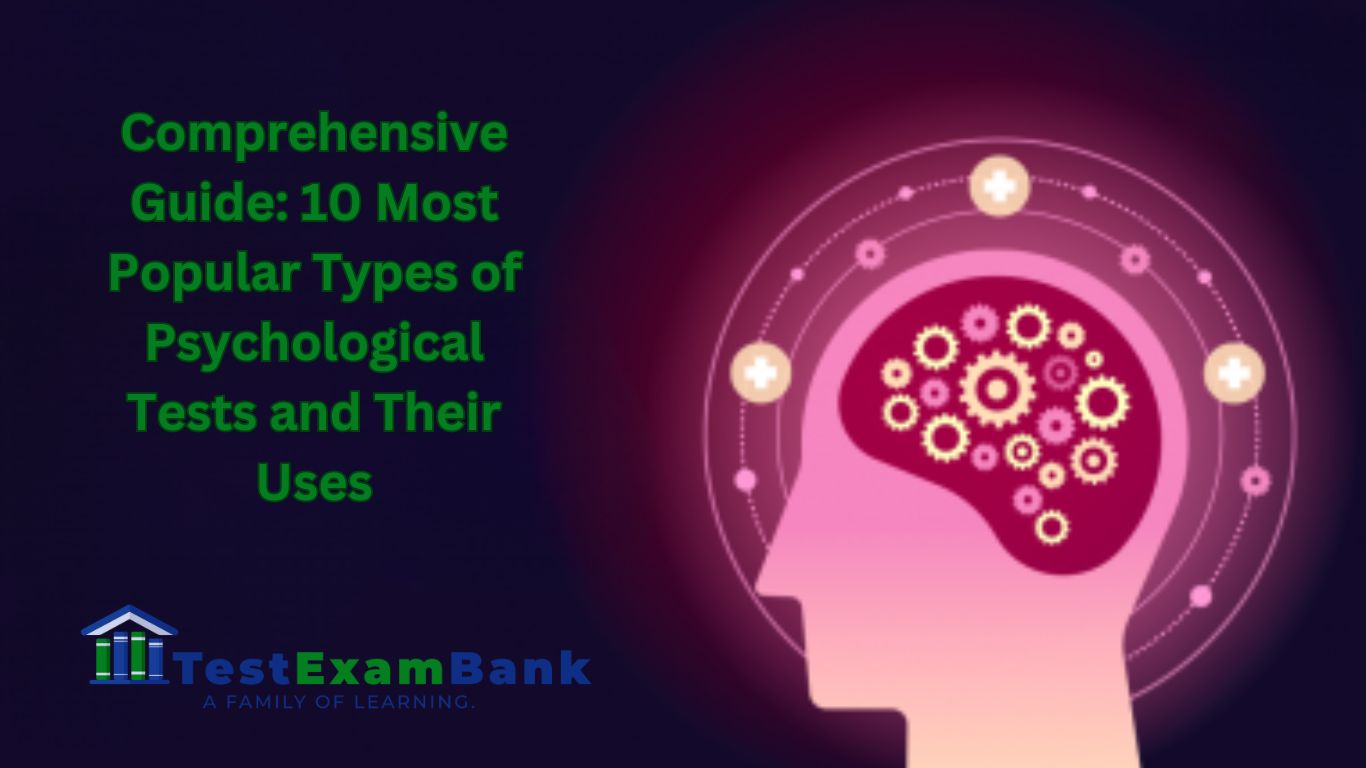
Psychological tests are diverse tools that psychologists use to assess various aspects of an individual’s mental functions, behavior patterns, and emotional state. There are several Types of Psychological Tests and assessments which serve multifaceted purposes, aiding in diagnosis, understanding, and treatment strategies. Let’s find out through the terrain of the types of psychological tests and psychological evaluations.
Psychological tests are like special tools that help us understand how our minds work. They’re a bit like maps that guide us through the twists and turns of our thoughts and feelings. These Types of Psychological tests show us different parts of who we are, like a mirror reflecting our personalities and how we think and feel.
In this guide, we dive into the Types of Psychological Tests and learn about the psychological tests. Think of them as tricky puzzles that help us figure out the mysteries of our minds. They help us understand things like our personalities and how smart we are. Each test is like a door that invites us to learn more about ourselves. So, get ready as we explore the ten most popular types of psychological tests these tests and see all the different ways they can help us understand ourselves better.
Purpose to know about all types of Psychological Tests:
Understanding the diverse types of psychological tests serves as a gateway to unravel the intricate tapestry of the human mind. Delving into these evaluations isn’t just an academic pursuit; it’s a journey toward self-discovery, clarity, and growth. Knowing about these tests is akin to possessing a compass in the vast landscape of the mind, guiding us through the complexities of personalities, cognitive abilities, and emotional landscapes.
Firstly, comprehending the types of psychological tests enables individuals to gain deeper insights into their own selves. These evaluations act as mirrors, reflecting aspects of our personalities, behaviors, and cognitive patterns that might otherwise remain concealed. By knowing about these tests, individuals can embark on a journey of self-awareness, understanding their strengths, weaknesses, and thought processes with greater clarity. Moreover, this knowledge can aid in personal development, fostering self-improvement and facilitating a deeper understanding of one’s emotions and behaviors in various situations.
Additionally, awareness about these types of psychological tests fosters informed decision-making in professional and personal realms. For instance, in educational settings, understanding the nuances of intelligence or achievement tests can empower educators and parents to better support students’ learning needs.
Similarly, in the corporate world, knowledge about personality assessments can assist in team dynamics, leadership development, and recruitment processes, ensuring better-suited placements and improved work environments. Overall, familiarity with these evaluations equips individuals and professionals alike with tools to navigate various aspects of life, from education and career to personal growth and relationships.
Types of Psychological Tests
Neuropsychological Tests
Neuropsychological evaluations delve into brain functions, scrutinizing cognitive abilities, memory, attention, and language. These Types of Psychological tests provide critical insights into brain injuries, neurological disorders, and cognitive impairments.
Personality Tests
Unraveling the complexities of an individual’s character, personality tests explore traits, behaviors, and thought patterns. These assessments like the Myers-Briggs Type Indicator (MBTI) or Big Five Personality Traits aid in career guidance, self-awareness, and interpersonal dynamics.
Intelligence Tests
Commonly known as IQ tests, intelligence assessments measure cognitive abilities encompassing reasoning, problem-solving, and comprehension. These tests aid in educational placements, identifying intellectual strengths, and addressing learning difficulties.
Projective Tests
Projective tests, like the Rorschach inkblot test or Thematic Apperception Test (TAT), delve into subconscious thoughts and emotions. They prompt individuals to interpret ambiguous stimuli, unveiling hidden aspects of their psyche.
Psychological Evaluation
Psychological evaluations encompass a broad spectrum, combining various tests to comprehensively assess mental health, behavior, and emotions. These evaluations aid in diagnostic clarity and treatment planning. Types of Psychological Tests can help to identify the different types of evaluation.
Observation
Observational assessments involve systematically observing and recording behavior in natural settings. They’re crucial in understanding social interactions, and developmental milestones, and diagnosing certain mental health conditions.
Achievement Tests
Assessing specific knowledge or skills, achievement tests gauge an individual’s proficiency in particular subjects or areas. These evaluations are prevalent in educational settings, aiding in measuring academic progress.
Medical Diagnosis
Types of Psychological Tests play a pivotal role in medical diagnosis, especially concerning mental health conditions. They assist healthcare professionals in determining diagnoses and tailoring treatment approaches.
The Varied Uses of Psychological Tests
These Types of Psychological tests find application in an array of fields:
- Clinical Settings: Diagnosing mental health conditions like depression, anxiety disorders, or schizophrenia.
- Educational Institutions: Assessing learning disabilities, determining educational placements, or evaluating academic progress.
- Corporate World: Guiding hiring processes, team dynamics, and leadership development.
- Forensic Psychology: Aiding in legal proceedings by assessing criminal behavior or competency to stand trial.
- Healthcare: Assisting in evaluating cognitive decline or brain injuries in medical settings.
Characteristics of psychological test
- Reliability: Psychological tests should consistently provide accurate results when administered repeatedly. It’s like having a scale that always gives you the same weight when you step on it.
- Validity: These tests need to measure what they’re supposed to measure. For instance, an intelligence test should actually measure intelligence, not something else.
- Standardization: They’re conducted under consistent conditions and follow specific procedures. It’s like following a recipe step-by-step to ensure the dish turns out the same every time.
- Objectivity: The interpretation of the test results should be impartial and based on clear criteria rather than influenced by personal opinions or biases.
- Norm-Referenced: Psychological tests compare an individual’s performance to that of a larger group (the ‘norm’). It’s like checking how fast a runner is compared to other runners in a race.
- Practicality: They need to be convenient to administer, score, and interpret, without being overly time-consuming or complex.
- Utility: Psychological tests should serve a useful purpose, whether it’s diagnosing a condition, guiding educational decisions, or providing insights into personality.
- Cross-Cultural Applicability: These tests should be applicable and relevant across different cultures and populations, ensuring fairness and accuracy in assessment regardless of background or ethnicity.
TestExamBank: Your Gateway to Comprehensive Assessment!
At TestExamBank, we redefine the landscape of assessments, offering a comprehensive suite of reliable and user-friendly psychological tests designed to illuminate the enigmatic realm of the human mind. Here’s why TestExamBank stands out:
- Diverse Range of Tests: Explore an extensive collection of psychological assessments covering intelligence, personality, cognitive abilities, and behavioral patterns. From understanding individual strengths to identifying areas for growth, our tests provide a holistic view.
- Reliability at Its Core: With a focus on precision and consistency, TestExamBank ensures that each test maintains high-reliability standards, providing accurate and dependable results every time they’re administered.
- User-Friendly Interface: Navigate our platform seamlessly. Whether you’re an educator, psychologist, HR professional, or an individual seeking self-discovery, our intuitive interface makes test administration, scoring, and interpretation hassle-free.
- Validity Guaranteed: Trust in the validity of our assessments. Our tests are meticulously crafted to measure exactly what they’re intended for, ensuring the results align with the assessment’s purpose.
- Customizable Solutions: Tailor assessments to your specific needs. TestExamBank offers flexibility, allowing customization of tests to suit diverse requirements across educational, clinical, or corporate settings.
- Accessible Anywhere, Anytime: Embrace convenience with our platform accessible online. Conduct assessments remotely, enabling seamless administration and quick access to results.
- Ethnically Diverse Norms: Embrace inclusivity with tests designed to be culturally and ethnically sensitive, ensuring fairness and accuracy across diverse populations.
- Comprehensive Support: Our team of experts is here to assist you every step of the way. From implementation support to interpretation guidance, we ensure a smooth and insightful experience.
Final Thoughts
Understanding the diverse types and uses of psychological tests underscores their significance in unraveling the complexities of human behavior and cognition. These assessments serve as compasses, guiding psychologists, educators, healthcare professionals, and individuals on journeys toward self-discovery, diagnosis, and growth.
FAQ:
What are the different types of psychological tests?
Psychological tests encompass various types, including personality tests, intelligence assessments, neuropsychological tests, projective tests, and achievement evaluations. Each type focuses on different aspects of cognition, behavior, or emotional functioning.
How do psychological tests help in understanding personalities?
Personality tests delve into an individual’s traits, behaviors, and thought patterns. They offer insights into characteristics, preferences, and potential tendencies, aiding in self-awareness, career guidance, and interpersonal dynamics.
What is the purpose of intelligence tests?
Intelligence tests measure cognitive abilities such as problem-solving, reasoning, and comprehension. They help in assessing intellectual strengths, educational placements, and understanding learning difficulties.
Are psychological tests accurate and reliable?
Psychological tests undergo rigorous development and validation processes to ensure reliability and accuracy. When administered by trained professionals under standardized conditions, these tests provide dependable results.
In what settings are psychological tests commonly used?
Psychological tests find applications across diverse settings such as clinical practices, educational institutions, corporate environments, and healthcare facilities. They aid in diagnosing mental health conditions, guiding educational placements, supporting team dynamics, and assessing cognitive abilities in medical settings.






